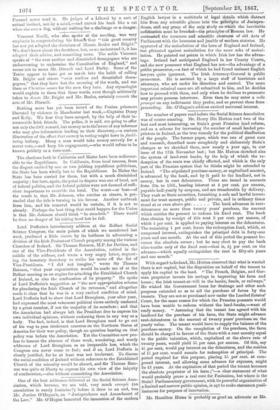With regard toIreland, Mr. Hutton observed that what is wanted
there is not capital, but the disposition on behalf of the tenant to apply his capital to the land. "The French, Belgian, and Ger- man proprietor invests his savings in improving his farm and house ; the Irish tenant-at-will in the banks, funds, or railways." He wished the Government loans for drainage and other such purposes extended so as to aid the purchase of farms by the tenants. They are not so purchased now under the Landed Estates' Court, for the same reason for which the Prussian peasants would have been unable to redeem without the land-banks,—want of ready money. "Assuming that the tenant has agreed with his landlord for the purchase of his farm, the State might advance rent-debentures to the amount of twenty years' purchase on the yearly value. The tenant would have to supply the balance of the purchase-money. On the completion of the purchase, the farm should be charged in favour of the State with a rent annuity equal to the public valuation, which, capitalized at the above rate of twenty years, would yield 5/. per cent. per annum. Of this, say 4/. per cent, would pay interest on the debentures, and the residue of 1/. per cent, would remain for redemption of principal. The period required for this purpose, placing 1/. per cent. at com- pound interest, and allowing some advance for expenses, might be 43 years. At the expiration of that period the tenant becomes the absolute proprietor of his farm ;"—a clear statement of what would probably prove a real cure for Fenianism, but where is the Stein? Parliamentary government, with its powerful organization of a limited and narrow public opinion, is apt to make statesmen pusil- lanimous for purposes of innovation.






























 Previous page
Previous page